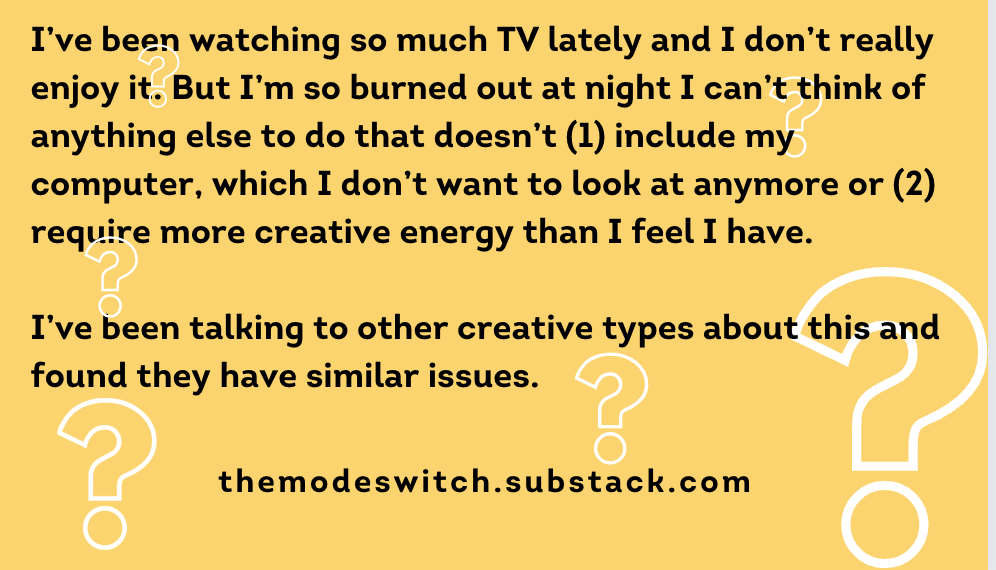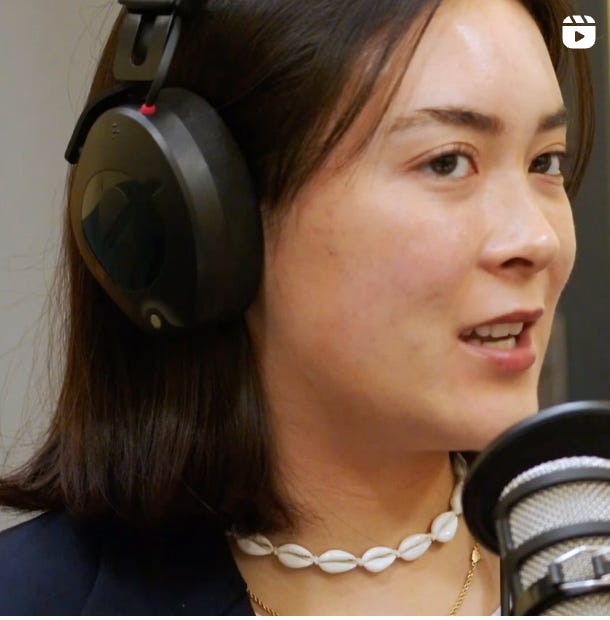I don’t often look at this timepiece, although it’s been on my office wall for two decades now. This afternoon I pointed my iPhone at it for a second, and it got me thinking about the man on the moon.
Did you know that, according to one tale, the man in the moon was exiled to the lunar surface for working on the sabbath? He was picking up sticks for a fire, or something.
(Sounds like corporate, right? Although you’re picking up email instead of sticks.)
You won’t be sent to the moon for working too much in 2024. But you will be on the clock a lot. Sometimes more than’s good for your soul. Let’s talk about it, shall we?
Hey, welcome the heck back to the Mode/Switch Newsletter. I was happy to stop writing over the holidays—and to do a lot of reading instead. (My daughter got me Cormac McCarthy’s novel Passenger, and it was so good I read it in two days.) But I’m very happy to get back to the workplace questions that the new year has already started raising for you and me.
Here, to get things started, is a problem one of you sent in just last week:
Heckuva quandary.
(And by the way, I’m always glad for your questions. Reply to this email or send me a note here. Let me know what the M/S Newsletter should be talking about.)
One place to start with this reader’s question, maybe, is to note that the world has two kinds of jobs that both raise this question.
The Job That Asks Too Little
I had one of these jobs once, working on an installation crew for a swimming pool company. Before you go imagining me beside pools in swanky resorts, skimming little bits of fluff off glimmering water, maybe from the comfort of a chaise lounge, I should say, yeah, not really.
Pool work was mucky work. It wasn’t always hard work. Sometimes, you just had to dodge the bucket of the backhoe as you clambered in and out of the hellaciously big hole. Sure, there were some twelve-hour days when you had to hang upside down, yanking and locking a 300 lb. vinyl liner into place. Sometimes you got sunburned head to hip and mud-caked hip to boot.
But basically, there were whole hours at a time where I was just lugging a bucket of vermiculite to some guy troweling the bottom of a pool. Sometimes I was just hurling dirt from one pile to another. You’d think that brainless work would leave lots of space for things I loved after work. But I’d come home and lie on the kitchen floor, staring at nothing but swirly ceiling plaster.
The Job That Asks Too Much
Corey Kohn started her Boulder-based software design company called DOJO4 to create truly excellent digital products. Most start-ups seek to become unicorns, which in entrepreneurial lingo means scaling a company till it makes a billion in profit. Corey’s member-owned company was a zebra instead—curious, colorful, and (unlike the unicorn) grounded in the real world. DOJO4’s work, she told me in an interview, aspired to put good things into the world.
Corey Kohn, Credit: DOJO4 website
I met Corey at a social enterprise conference in Santa Cruz. Jewish by upbringing, Buddhist by choice, she was astonishingly comfortable talking about all the hard stuff you’re not supposed to talk about at work: politics, religion, chronic illness, the cost of housing. She always had spry things to say. The interview was so much fun that, in a highly unusual move, we decided to launch a podcast together. She had a background in documentary film production, so turning her family’s sauna into a recording studio was (for her) a cinch.
For a while, our podcast was a joyous little side hustle. We talked about hard stuff and found good ways to laugh and dreamed about what workplace community could be.
And then one week Corey disappeared. She sent a note saying that running a company, caring for her family—geez, it was all stacking up to a lot of overwhelm. No time for a podcast for her.
In a way, she was lucky to lead a company that used so much of her brain. But her regret sounded genuine all the same. I think that, for her, the podcast had been a chance to make a small creative product wholly unrelated to her job’s bottom line.
So, which of those two jobs is more like yours?
Is it more like my swimming-pool gig, not asking much thought (my supervisor called me a “grunt”) but demotivating other soul-satisfying work after work?
Or is it like Corey’s, an enormously creative effort asking so much that you have to set aside other life-giving projects?
The question—to take things back to what the reader asks above—is what to do when you’re killing it at work, but your work is killing you.
Here are a couple of things to try:
Don’t let your job fall into a binary between Ultimate Meaning and No Meaning.
Nobody’s work, not even Corey’s, will offer transcendent fulfillment. Avoid putting that kind of pressure on your job—and you’ll leave room for fulfillment after work.
On the other hand, nobody’s work is completely devoid of significance. It may be a quantum of significance, admittedly. Your job’s probably not visible from the moon. But look at your job at the scale it requires.
Last year, on my birthday, my mom gave me a collection of essays by the poet Mary Oliver. I’m finally getting around to read the book in 2024. The first essay in the collection includes a little prayer I’m hoping will help me right-size my work this year: “May I be the tiniest nail in the house of the universe, tiny but useful.”
(You can read Oliver’s short but gorgeous essay here. Or I can loan you my copy of the book next time you’re in Grand Rapids.)
Decide whether you need a mode of relaxation or a mode of creativity.
You’re probably familiar with all the dour studies on how bad screen time can be for your psychological health. (Here’s a typical one.) This sort of media scholarship can overlook (a) the way some populations cannot afford to unplug from their screens, because those screens are their only portal for economic advancement and (b) the remarkably different ways people use screens.
Binge-watching Succession as my partner and I have been doing lately can be relaxing. And sometimes that’s the mode the doctor ordered. At any rate, watching the show has opened space to talk about character, family, and power.
But other times, your soul genuinely needs a mode of creative production, even if after work it feels like you don’t have it in you. I asked Tyler Etters, an artist friend of mine who works as a senior web engineer at Output, Inc. Here’s what he had to recommend.
I love the way Tyler’s wisdom is both resilient (he shows up to his artistic work) and humble (he admits that sometimes nothing happens).
But what about you? How do you manage to be creative when your job threatens to squelch your soul? Send me a note, and I’ll ask your permission to publish it in the Mode/Switch.
I know we’re all supposed to be making resolutions right about now. (Mine this year is to do some pull-ups for the first time in my life.) But here’s an honest question: are we allowed to make resolutions for each other? You know, like, non-binding resolutions?
Here’s my new year’s resolution for you, that you’d do your work and live your life, not like the man on the moon but like a child of earth. What? Go with me on this one. When my kids were small, we used to read this poem by Robert Frost called “Birches,” in which the speaker says of a little boy who loves to swing on birch branches, “Earth’s the right place for love.”
Exactly right. Earth’s precisely where the rest of us need you doing your work, yes, but also doing what makes your love possible, viable, shareable.
-craig
What I’m up to in 2024…
My book Digital Overwhelm’s coming out late this spring. The publisher (Cascade) sent me a peek at the cover. So far, so sweet.
Emily Bosscher and I are moving forward with Mode/Switch conversation-starter cards for managers seeking to cultivate good talk with their teams.
Presenting a talk with a team of Calvin folks at a NetVue conference in Atlanta in April. It’s a conference focused on vocation—with close ties to the work we do here at the Mode/Switch.
Speaking of “we,” the Mode/Switch team has hired a new communications coordinator, Hannah Sherbrooke. You may remember her as one of our guests last year on the Mode/Switch Pod. You can see her briefly in this reel.
But for convenience, I grabbed a screenshot from the M/S Instagram:
Speaking of the Pod, join us every Friday morning on Spotify for our intergenerational conversation focused on repairing the divides that open on teams when boomers, X-ers, millennials, and Zs work together.
And one last thing…
Please take our survey here. It’ll take you 5 minutes to tell us about what energizes you at work—or doesn’t. But your responses will animate research for this newsletter for 2024 and beyond.








